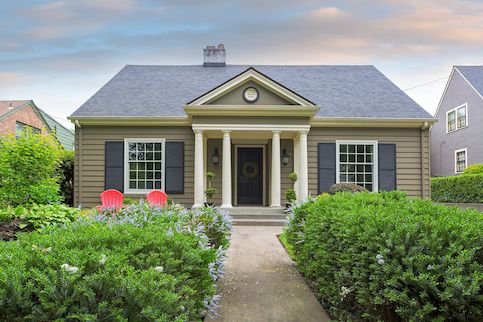If you’re buying a home for the first time, you’ll quickly discover you have lots of choices when it comes to getting a mortgage. In addition to choosing between the different types of home loans, you’ll also have to decide between a 15-year or 30-year mortgage.
You may be tempted to choose the loan with the best interest rate, but there are other factors to consider – like your monthly payment, total loan cost and financial goals. Below, learn more about 15-year versus 30-year mortgages and how to choose the right one for you.
Key Takeaways:
- A 15-year mortgage comes with lower interest rates and a lower lifetime cost, but you’ll end up with higher monthly payments.
- A 30-year mortgage has higher interest rates and a higher lifetime cost, but the monthly payments are more affordable.
- A 15-year mortgage lets you build equity faster, but it can also be harder to qualify for.
- You may be able to change your loan term by refinancing from a 30-year mortgage to a 15-year mortgage, or vice versa.
- In addition to 15-year and 30-year mortgages, you can get mortgage loans with 20-, 25- or 40-year terms.
What’s The Difference Between A 15-Year And A 30-Year Mortgage?
The difference between a 15-year and a 30-year mortgage is relatively simple, but these loans have very different financial implications.
A 30-year mortgage is a loan that’s intended to be paid off over 30 years. A 15-year mortgage is paid off over 15 years. Because 30-year mortgages have a longer repayment period, their monthly payments are smaller. However, 30-year mortgages generally come with higher interest rates. According to Freddie Mac, nearly 90% of buyers choose a 30-year fixed-rate mortgage.
Monthly Payment
When comparing a 15-year mortgage to a 30-year mortgage with the same interest rate and loan amount, the monthly payment for the 15-year mortgage will be higher. This is because the borrower repays the loan in half the time, so each monthly payment has to cover a larger portion of the principal.
To illustrate how monthly payments differ between a 15-year and 30-year mortgage, consider the following example. (For simplicity’s sake, taxes and insurance aren’t included.)
Say you want to borrow $300,000, and you qualify for a rate of 6% APR. (Remember, interest rates for 15-year and 30-year loans differ, but this example shows how your monthly payment would change based on term length, even with the same rate.)
With a 30-year mortgage at 6% APR, your monthly payment would be $1,798.65. With a 15-year mortgage at the same rate, your payment would be $2,531.57.
- Loan amount: $300,000 at 6.0% APR
- 30-year mortgage monthly payment: $1,798.65
- 15-year mortgage monthly payment: $2,531.57
Interest Rate
A 15-year mortgage often comes with a lower interest rate than a 30-year mortgage. This is because lenders typically view shorter-term loans as less risky since they’ll be paid back in half the time. As a result, lenders are willing to offer more favorable rates. For example, as of September 18, 2025, the average 30-year mortgage rate is 6.26%. Meanwhile, the average 15-year rate is 5.41%, according to Freddie Mac.
The following example shows what your monthly payments would be on a $300,000 loan with a 30-year term at 6% APR and a 15-year term at 5.50% APR.
- Loan amount: $300,000
- 30-year mortgage monthly payment at 6.0% APR: $1,798.65
- 15-year mortgage monthly payment at 5.5% APR: $2,451.25
Even though the 15-year loan has a lower interest rate, the monthly payment is still significantly larger than with the 30-year loan. However, that slight decrease in interest will save you a lot over the life of the loan. For example, if the 30-year loan had a 5.5% interest rate, the monthly payment would be $1,703.37. That’s a difference of about $95 every month, showing the impact of even a slight decrease in interest rate.
Lifetime Cost Of Your Home
Over the life of a mortgage, the amount you pay depends not only on your interest rate but also on the length of time you’re paying that interest. A shorter term, as in a 15-year mortgage, combined with a potentially lower interest rate, means you’re likely to pay significantly less in total interest compared to a 30-year loan.
Consider the total amount you’d pay for your home, in terms of principal and interest, over the life of each loan:
- Loan amount: $300,000
- Total amount paid over the life of a 30-year mortgage at 6.0% APR: $647,514
- Total amount paid over the life of a 15-year mortgage at 5.5% APR: $441,225
In this example, by opting for a 15-year mortgage instead of a 30-year mortgage, you’d save more than $200,000 over the life of the loan.
Compare Mortgage Offers From Verified Lenders:
Pros And Cons Of A 15-Year Mortgage Loan
When considering a 15-year mortgage, weigh the following pros and cons.
Pros
- Own Your Home Sooner: A significant benefit of going with a 15-year mortgage is that you’ll own your home free and clear in 15 years. Another way to think about this? No more mortgage payments after 15 years. Some people prioritize being debt-free sooner. If you don’t want to have a loan hanging over you for three decades, a 15-year mortgage may be a good fit.
- Build Equity Faster: With a 15-year mortgage, you also build home equity faster. Home equity is the portion of your property that you own. It’s the difference between what your home is worth and what’s left on your loan. When you pay off your mortgage at double speed, you build up equity at a quicker pace. This gives you more options and financial flexibility, allowing you to refinance your mortgage or borrow against your home equity.
Cons
- Higher Monthly Payments: Before you commit to a higher monthly mortgage payment, take an honest look at your budget, savings and lifestyle. You don’t want to end up house poor, meaning that after housing costs, you have little left over for other expenses. Additionally, if your circumstances change and you have trouble making that larger payment, you risk losing your home to foreclosure.
- May Be Harder To Qualify: Since a 15-year mortgage requires you to make larger monthly payments, lenders want to be sure that you have the ability to repay the loan. Because of this, a 15-year mortgage could be tougher to qualify for than a 30-year mortgage.
What’s Your Goal?
Buy A Home
Discover mortgage options that fit your unique financial needs.

Refinance
Refinance your mortgage to have more money for what matters.
Tap Into Equity
Use your home’s equity and unlock cash to achieve your goals.
What Are The Pros And Cons Of A 30-Year Mortgage Loan?
The more popular 30-year mortgage has its pros and cons as well. Here are the big ones:
Pros
- More Borrowing Potential: A 30-year mortgage could allow borrowers to afford a more expensive home due to lower monthly payments. And for some homebuyers, stretching their payments over 30 years is the only way to make home buying affordable.
- More Flexible Requirements: A 30-year mortgage may come with more lenient income requirements compared to a 15-year term. Because of the lower monthly payments, it’s easier for borrowers to meet lenders’ debt-to-income criteria. As a result, the 30-year mortgage makes homeownership accessible to more people.
Cons
- Takes Longer To Own Your Home: A 30-year mortgage extends the time it takes to fully own your property, keeping a lien on the home for twice as long as a 15-year term. Depending on your age, circumstances and financial goals, having debt for several decades may cause extended financial strain.
- More Lifetime Interest Paid: A longer-term loan means more time spent paying interest. Combined with the longer repayment term, interest rates are higher on a 30-year mortgage. This means you’ll end up paying significantly more over the life of a 30-year mortgage versue a 15-year mortgage.
Ready To Become A Homeowner?
Get matched with a lender that can help you find the right mortgage.
Should You Refinance To A 30-Year Mortgage Or A 15-Year Mortgage?
Refinancing your house involves replacing your existing mortgage with a new one – often to secure a lower interest rate or change your loan term.
Refinancing to change your mortgage term can have a significant impact on your finances, whether you’re thinking of shortening your loan duration or extending it. But there may be some scenarios in which doing so makes sense.
30-Year Mortgage To 15-Year Mortgage
You might consider refinancing from a 30-year mortgage to a 15-year mortgage if:
- Your income rises significantly: A big income boost can make higher monthly payments more manageable.
- Your credit score improves: A higher score might get you more favorable refinance terms.
- Rates drop: A significant rate drop may be enough to make a 15-year mortgage payment more affordable.
- You have plenty of time left on your current loan: You need at least 15 years left on your 30-year mortgage in order for switching to be beneficial.
Keep in mind that there’s a cost to refinancing, so weigh this against the potential interest savings you’d get with a new loan.
15-Year Mortgage To 30-Year Mortgage
There are also some situations when extending your mortgage could make sense. Consider doing so if:
- You need more financial flexibility: Life can throw curveballs, such as job loss, medical emergencies or unexpected expenses. A 30-year mortgage can substantially decrease your monthly payments, giving you some short-term relief.
- You have other debt: High-interest debt can snowball quickly, taking up a large portion of your monthly budget. A lower monthly mortgage payment can help you allocate more cash toward those high-interest debts, helping you pay them off sooner.
- You want to invest your money elsewhere: You might get a bigger bang for your buck by investing your money somewhere else instead of putting it toward your home loan. If you can earn returns that outweigh the interest saved on a shorter-term mortgage, refinancing to a longer term might be wise.
Remember, extending your mortgage term means prolonged debt, slower equity buildup and a potentially higher interest rate. Before refinancing a mortgage, you may want to meet with a financial advisor who can help you make an informed decision.
Alternatives To 15-Year And 30-Year Mortgages
While 15- and 30-year fixed-rate mortgages are by far the most popular terms, they’re not the only mortgage options out there. The mortgage landscape is diverse, offering additional term lengths and adjustable-rate options for different needs.
20-Year Mortgages
Compared to a 30-year mortgage, a 20-year mortgage offers faster equity building, saves you more interest over time and may come with a lower interest rate. However, monthly payments will be higher than those of a 30-year mortgage.
25-Year Mortgages
A 25-year mortgage is a middle ground between the 20- and 30-year terms, offering slightly faster equity building, some interest savings and potentially a lower rate. But monthly payments are still higher than those of a 30-year term.
40-Year Mortgages
A 40-year mortgage stretches loan payments over an even longer period of time, lowering your monthly payment and giving you more flexibility in your budget. However, it’ll take longer to build equity, you may have a higher interest rate, and your home will end up costing more due to the longer timeline.
Adjustable-Rate Mortgages
An adjustable-rate mortgage (ARM) has a rate that can go up or down. Often, ARMs have a lower interest rate during the first few years, making the early stages of the loan more affordable. However, after this introductory phase, the rate can fluctuate, potentially increasing based on market conditions.
If you don’t plan to stay in your house for the long haul, an ARM can make sense. Ideally, you get a lower interest rate for those first few years and sell the house before the rate gets too high. However, if plans change and you decide to stay, you could end up with an unaffordable payment.
Take The First Step To Buying A Home
Find a lender that will work with your unique financial situation.
15-Year Vs. 30-Year Mortgage: FAQs
There’s a lot to know when deciding between a 15-year and 30-year mortgage. Find answers to some common questions about 15-year versus 30-year mortgages below:
1. Mortgage recast: A mortgage recast lets you pay off a chunk of your mortgage principal to lower your monthly payment – without changing your interest rate or term. This might make sense if you receive a significant lump sum of money, like an inheritance or property sale proceeds. Check with your lender for eligibility and potential fees.
2. Additional principal payments: If your lender allows it, this method helps you pay off your loan faster and save on interest. When you make an extra payment, tell your lender to put it toward paying off the loan principal, not the interest. This lowers the amount you’ll pay in total interest and helps you repay the loan in less time.
3. Biweekly payments: You may be able to split your monthly mortgage payment in half and pay that amount every 2 weeks. For instance, if your monthly payment is $1,600, pay $800 biweekly. This subtle difference from the monthly approach equates to 13 full mortgage payments annually, allowing you to chip away at your balance faster. Check with your lender.
Before using any of these strategies, check with your lender to make sure there are no fees or penalties for paying off your mortgage early.
You can also consider a rate and term refinance, which replaces your current loan with one that has more favorable terms. For instance, if you have a high interest rate and rates have recently dropped, you could refinance to get the lower rate. This process also allows you to adjust the term of your loan, potentially converting from a 15-year to a 30-year loan. Keep in mind that while this will lower your monthly payments, it may increase the total interest paid over the life of the loan.
The Bottom Line: Is A 15-Year Or 30-Year Mortgage Right For You?
There’s no one-size-fits-all mortgage. Whether a 15-year or 30-year mortgage is best for you depends on your financial situation and your goals. A 15-year loan may work for borrowers looking to build home equity quickly and own their homes in less time – and who have plenty of cash to put toward a bigger monthly payment. On the other hand, a 30-year loan might be a better choice for those who want more flexibility in their budget.
Use Quicken Loans’ Mortgage Calculator to compare monthly payments and total costs of 15-year versus 30-year mortgages.

Ben Shapiro
Ben Shapiro is an award-winning financial analyst with nearly a decade of experience working in corporate finance in big banks, small-to-medium-size businesses, and mortgage finance. His expertise includes strategic application of macroeconomic analysis, financial data analysis, financial forecasting and strategic scenario planning. For the past four years, he has focused on the mortgage industry, applying economics to forecasting and strategic decision-making at Quicken Loans. Ben earned a bachelor’s degree in business with a minor in economics from California State University, Northridge, graduating cum laude and with honors. He also served as an officer in an allied military for five years, responsible for the welfare of 300 soldiers and eight direct reports before age 25.












